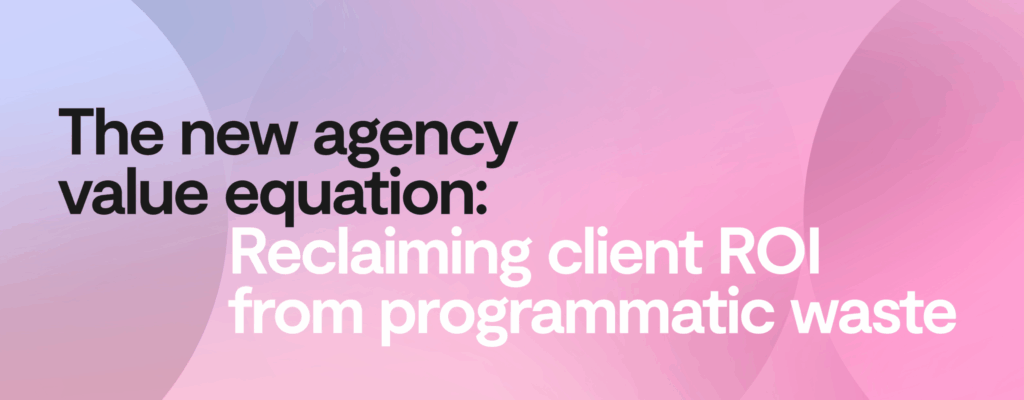- Blog
- Advertisers
First-party data, scale and trust – the agency viewpoint
In conversation with Dave Carpenter, Head of Digital at Goodstuff Communications 2020 has been a year like no other for the advertising industry, a month ago all we could talk about was Google’s announcement to stop third-party cookies. News that shook the digital advertising industry. Since then we have been faced with a global pandemic that has tested our business models and ability to adapt. With all of these challenges, publishers still need a forum. A chance to share and learn from each other. This is why on 26 March we hosted our first “virtual” publisher breakfast of the year….

In conversation with Dave Carpenter, Head of Digital at Goodstuff Communications
2020 has been a year like no other for the advertising industry, a month ago all we could talk about was Google’s announcement to stop third-party cookies. News that shook the digital advertising industry. Since then we have been faced with a global pandemic that has tested our business models and ability to adapt.
With all of these challenges, publishers still need a forum. A chance to share and learn from each other. This is why on 26 March we hosted our first “virtual” publisher breakfast of the year. The inaugural session in a series where we aim to get the publishing industry to collaborate, learn and also hear from the agencies and advertisers that make up our ecosystem.
When we speak to publishers there is a sense of urgency to get their first-party data organised and create a strategy for a future without third-party cookies. However, we rarely speak to the buy-side to ask them if they feel the same. For this first event, we had the pleasure of having Dave Carpenter, Head of Digital at Goodstuff Communications, join us for a Q&A.
We started by asking about data. Today, over 40% of all impressions available on the open-market are un-targetable because there is no data available on browsers like Safari and Firefox. Dave was clear that there wasn’t much urgency until earlier this year, when Google’s announcement hit. As an industry we need to talk more about the future (without cookies) and start to humanise it for advertisers. The good news is that we are seeing now, more than ever, advertisers wanting to use first-party data in briefs. This is a huge step in the right direction, however ultimately it comes down to how advertising is measured.
Measurement
The majority of spend in digital advertising today has a conversion goal associated with it, meaning that if you can’t measure it (with third-party cookies) then the budgets will go to where it can be measured. The biggest challenge is how to convince advertisers to measure in a different way.
So how do we bridge this?
For performance campaigns, publishers will have to get closer to what the advertiser is measuring. It’s about understanding what attribution model is being used and what role each party plays.
For brand campaigns, insights are much more important for advertisers. It’s no longer enough to give insights on what consumers are reading. Publishers should be braver; they should go one step further and give advertisers more information based on how users are consuming media, analyse the data and tell a story more than just reporting on it.
First-party data
When asked about first-party data from publishers, the biggest question Dave’s advertisers are asking is how can publishers share that data? At the moment advertisers don’t have their data in the right place or are not comfortable sharing it. Publishers need to work on ways to share their data with advertisers in a safe and reliable way. There are many options to do that, it is about working out which one works. This will become much more important once the data that we rely on today is less available.
For Goodstuff there are two ways they look at data – Control and Transparency. Dave is clear that publishers have a huge advantage here. They have the ability to build audiences with agencies and be transparent about how those data sets are created. These audiences can then be scaled and affinity can be defined.
Analytics
Turning to analytics, Dave had a very refreshing point of view and said it’s fine when a campaign doesn’t work. It’s more interesting to learn from campaigns that didn’t work. Publishers should be able to contextualise all campaigns when they work and don’t. Tell a story about your audience and how they interacted with the campaign. What can the advertiser learn about their consumers from the data that you have?
Agency structure
Dave then talked about bringing digital closer to the client brief. Digital isn’t new, however, there’s still a gap and far too often digital doesn’t influence the brief as much as it should. Briefs can start with a strategic idea, but when it gets executed it is transactional and more about buying media for the cheapest price.
What could change this? If agencies can access data (self-serve) through a platform in a compliant way then this will help deliver closer conversations. If publisher data informs a planner and the advertiser’s strategy then publishers are more likely to get involved with the brief.
It was clear that there’s still an element of letting the dust settle and see what Google does in order to decide how agencies are going to adapt. One option is agencies will have a network of first-party data partners that will work directly with agencies. If this happens, the relationship between publisher and agency will have to be stronger because there will be fewer intermediaries (no third-parties). To get ready for this publishers will need to understand their data and media and figure out how to package this in a way that buyers will want.
You may be interested in
From scale to accountability: The new agency value equation
Learn MoreThe curation revolution: Rebuilding trust and transparency in programmatic
Learn MoreKeep going, there's more to uncover.
From scale to accountability: The new agency value equation
Discover how leading agencies are rebuilding efficiency and accountability in programmatic media. Learn the 3-step blueprint to reclaim ROI, reduce waste, and deliver verifiable performance through data-enriched PMPs.
The curation revolution: Rebuilding trust and transparency in programmatic
Discover how leading agencies are rebuilding efficiency and accountability in programmatic media. Learn the 3-step blueprint to reclaim ROI, reduce waste, and deliver verifiable performance through data-enriched PMPs.
The performance paradox: Why programmatic efficiency is broken
Discover how leading agencies are rebuilding efficiency and accountability in programmatic media. Learn the 3-step blueprint to reclaim ROI, reduce waste, and deliver verifiable performance through data-enriched PMPs.
The new agency value equation: Reclaiming client ROI from programmatic waste
Discover how leading agencies are rebuilding efficiency and accountability in programmatic media. Learn the 3-step blueprint to reclaim ROI, reduce waste, and deliver verifiable performance through data-enriched PMPs.
Curation as a revenue diversification strategy: Lessons from The Arena Group
The Arena Group is finding new ways to take control of its data and revenue. Discover their powerful new approach centered on curation.
How Acxiom and Fundamental Group are solving for the Outcomes Era
Acxiom’s Ruowen Liscio and Fundamental Group’s Angus Maclaine discuss solutions for the Outcomes Era in advertising. Discover how predictive targeting, curation, and AI are delivering results in a privacy-first world.





